PPMP20008: Planning and Initiation Phase Project Management Lessons
VerifiedAdded on 2023/06/04
|9
|2204
|431
Report
AI Summary
This report is a self-reflection on the lessons learned while undertaking the PPMP20008 unit, Planning and Initiation phase of projects in project management. It discusses the student's initial plans for collecting and documenting lessons, comparing them with what actually occurred during the course. The reflection covers challenges faced, such as the lack of a structured learning framework and time management issues. Key lessons identified include the importance of a structured learning strategy, understanding underlying project needs, and the crucial role of commitment in successful learning. The report also details improvement strategies for each lesson, focusing on distributed practice, understanding expected outcomes, and developing a study timetable. The student aims to implement these changes to enhance their learning and meet the course's learning outcomes.

TERM 2 ASS_3
LESSONS LEARNT
Name: Insert full name
Student Number Insert student number
Campus: Insert campus or distance
Tutor: Insert tutor name
Tutorial number: Insert the tutorial number
LESSONS LEARNT
Name: Insert full name
Student Number Insert student number
Campus: Insert campus or distance
Tutor: Insert tutor name
Tutorial number: Insert the tutorial number
Paraphrase This Document
Need a fresh take? Get an instant paraphrase of this document with our AI Paraphraser

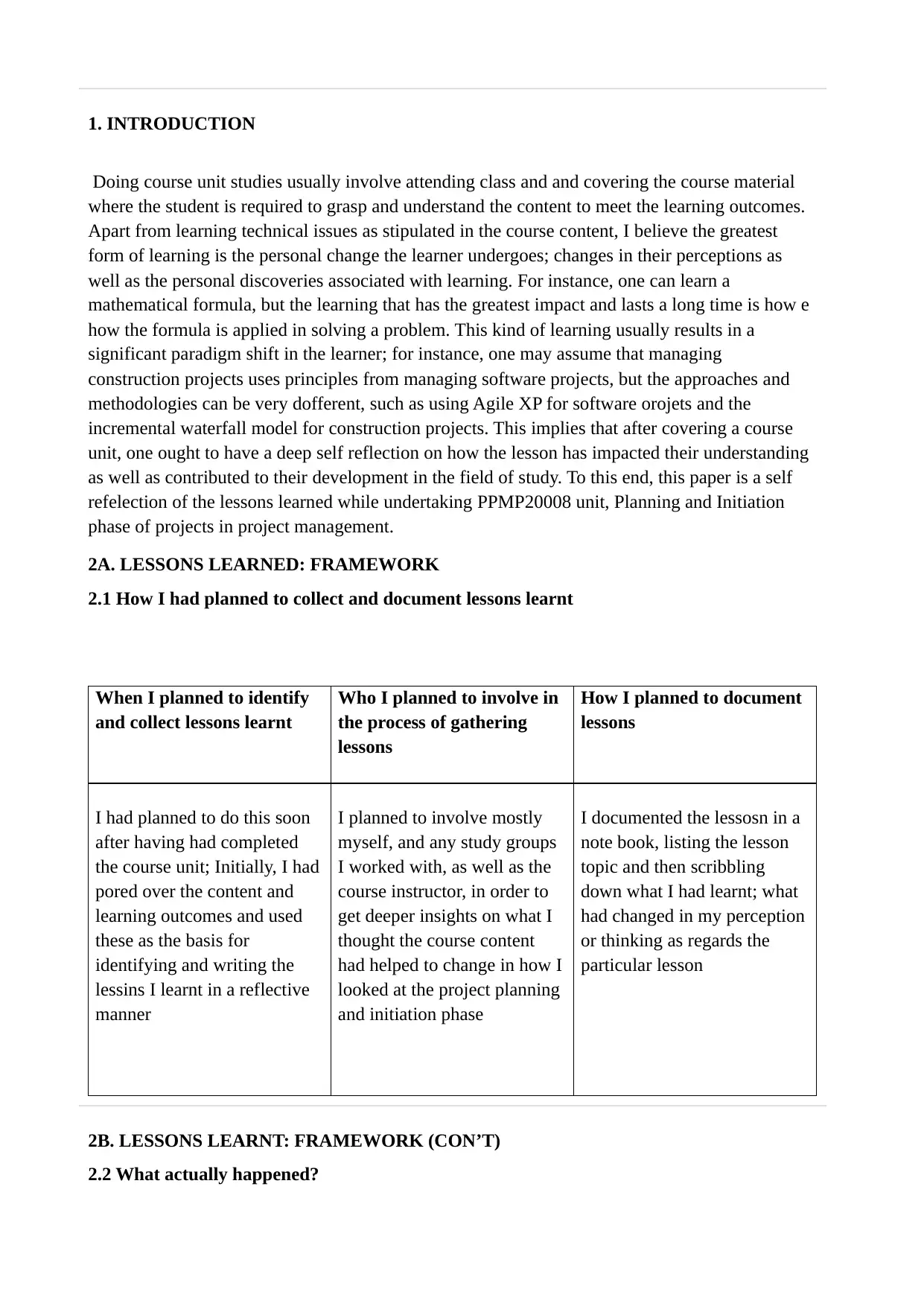
1. INTRODUCTION
Doing course unit studies usually involve attending class and and covering the course material
where the student is required to grasp and understand the content to meet the learning outcomes.
Apart from learning technical issues as stipulated in the course content, I believe the greatest
form of learning is the personal change the learner undergoes; changes in their perceptions as
well as the personal discoveries associated with learning. For instance, one can learn a
mathematical formula, but the learning that has the greatest impact and lasts a long time is how e
how the formula is applied in solving a problem. This kind of learning usually results in a
significant paradigm shift in the learner; for instance, one may assume that managing
construction projects uses principles from managing software projects, but the approaches and
methodologies can be very dofferent, such as using Agile XP for software orojets and the
incremental waterfall model for construction projects. This implies that after covering a course
unit, one ought to have a deep self reflection on how the lesson has impacted their understanding
as well as contributed to their development in the field of study. To this end, this paper is a self
refelection of the lessons learned while undertaking PPMP20008 unit, Planning and Initiation
phase of projects in project management.
2A. LESSONS LEARNED: FRAMEWORK
2.1 How I had planned to collect and document lessons learnt
When I planned to identify
and collect lessons learnt
Who I planned to involve in
the process of gathering
lessons
How I planned to document
lessons
I had planned to do this soon
after having had completed
the course unit; Initially, I had
pored over the content and
learning outcomes and used
these as the basis for
identifying and writing the
lessins I learnt in a reflective
manner
I planned to involve mostly
myself, and any study groups
I worked with, as well as the
course instructor, in order to
get deeper insights on what I
thought the course content
had helped to change in how I
looked at the project planning
and initiation phase
I documented the lessosn in a
note book, listing the lesson
topic and then scribbling
down what I had learnt; what
had changed in my perception
or thinking as regards the
particular lesson
2B. LESSONS LEARNT: FRAMEWORK (CON’T)
2.2 What actually happened?
Doing course unit studies usually involve attending class and and covering the course material
where the student is required to grasp and understand the content to meet the learning outcomes.
Apart from learning technical issues as stipulated in the course content, I believe the greatest
form of learning is the personal change the learner undergoes; changes in their perceptions as
well as the personal discoveries associated with learning. For instance, one can learn a
mathematical formula, but the learning that has the greatest impact and lasts a long time is how e
how the formula is applied in solving a problem. This kind of learning usually results in a
significant paradigm shift in the learner; for instance, one may assume that managing
construction projects uses principles from managing software projects, but the approaches and
methodologies can be very dofferent, such as using Agile XP for software orojets and the
incremental waterfall model for construction projects. This implies that after covering a course
unit, one ought to have a deep self reflection on how the lesson has impacted their understanding
as well as contributed to their development in the field of study. To this end, this paper is a self
refelection of the lessons learned while undertaking PPMP20008 unit, Planning and Initiation
phase of projects in project management.
2A. LESSONS LEARNED: FRAMEWORK
2.1 How I had planned to collect and document lessons learnt
When I planned to identify
and collect lessons learnt
Who I planned to involve in
the process of gathering
lessons
How I planned to document
lessons
I had planned to do this soon
after having had completed
the course unit; Initially, I had
pored over the content and
learning outcomes and used
these as the basis for
identifying and writing the
lessins I learnt in a reflective
manner
I planned to involve mostly
myself, and any study groups
I worked with, as well as the
course instructor, in order to
get deeper insights on what I
thought the course content
had helped to change in how I
looked at the project planning
and initiation phase
I documented the lessosn in a
note book, listing the lesson
topic and then scribbling
down what I had learnt; what
had changed in my perception
or thinking as regards the
particular lesson
2B. LESSONS LEARNT: FRAMEWORK (CON’T)
2.2 What actually happened?
⊘ This is a preview!⊘
Do you want full access?
Subscribe today to unlock all pages.

Trusted by 1+ million students worldwide
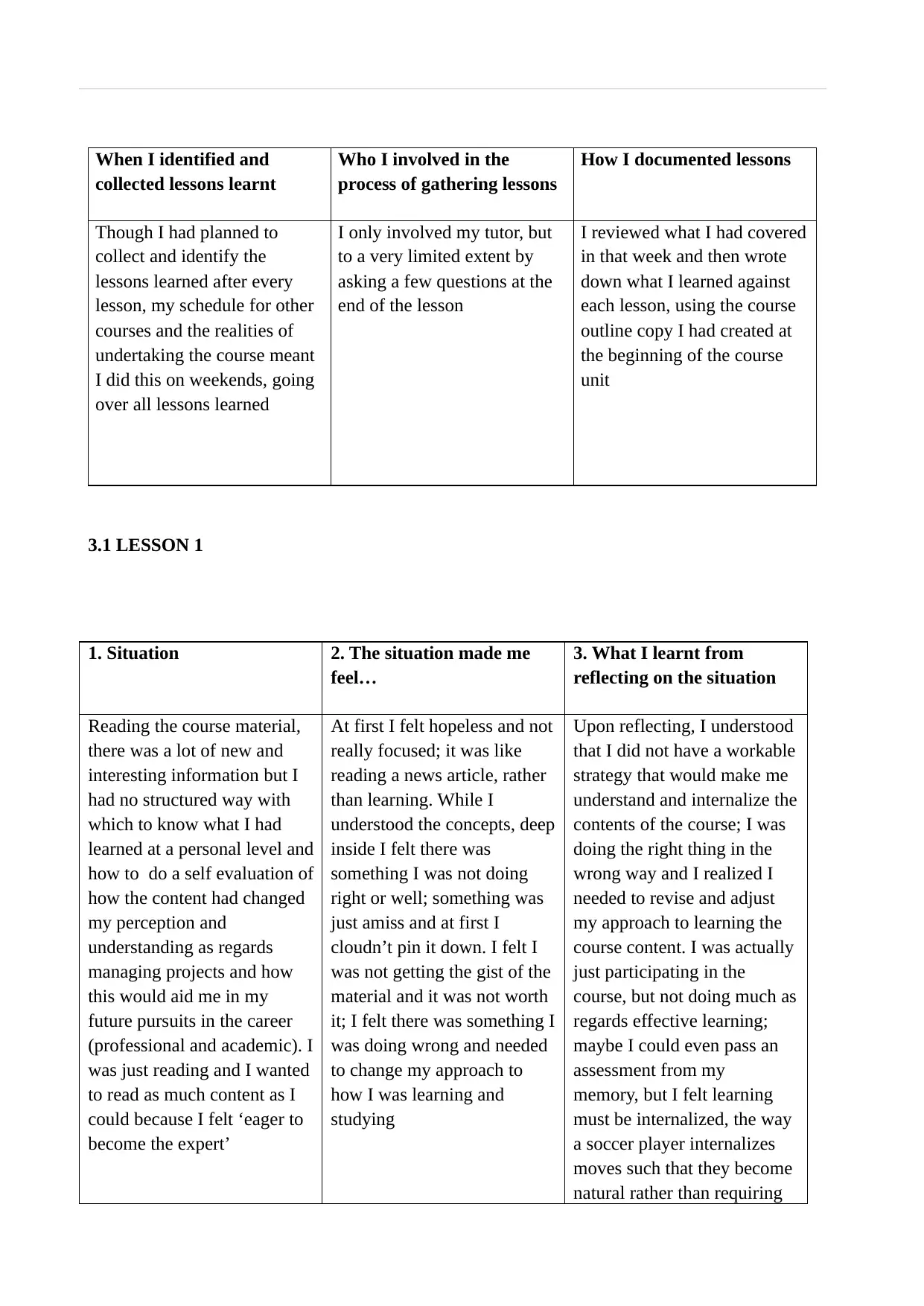
When I identified and
collected lessons learnt
Who I involved in the
process of gathering lessons
How I documented lessons
Though I had planned to
collect and identify the
lessons learned after every
lesson, my schedule for other
courses and the realities of
undertaking the course meant
I did this on weekends, going
over all lessons learned
I only involved my tutor, but
to a very limited extent by
asking a few questions at the
end of the lesson
I reviewed what I had covered
in that week and then wrote
down what I learned against
each lesson, using the course
outline copy I had created at
the beginning of the course
unit
3.1 LESSON 1
1. Situation 2. The situation made me
feel…
3. What I learnt from
reflecting on the situation
Reading the course material,
there was a lot of new and
interesting information but I
had no structured way with
which to know what I had
learned at a personal level and
how to do a self evaluation of
how the content had changed
my perception and
understanding as regards
managing projects and how
this would aid me in my
future pursuits in the career
(professional and academic). I
was just reading and I wanted
to read as much content as I
could because I felt ‘eager to
become the expert’
At first I felt hopeless and not
really focused; it was like
reading a news article, rather
than learning. While I
understood the concepts, deep
inside I felt there was
something I was not doing
right or well; something was
just amiss and at first I
cloudn’t pin it down. I felt I
was not getting the gist of the
material and it was not worth
it; I felt there was something I
was doing wrong and needed
to change my approach to
how I was learning and
studying
Upon reflecting, I understood
that I did not have a workable
strategy that would make me
understand and internalize the
contents of the course; I was
doing the right thing in the
wrong way and I realized I
needed to revise and adjust
my approach to learning the
course content. I was actually
just participating in the
course, but not doing much as
regards effective learning;
maybe I could even pass an
assessment from my
memory, but I felt learning
must be internalized, the way
a soccer player internalizes
moves such that they become
natural rather than requiring
collected lessons learnt
Who I involved in the
process of gathering lessons
How I documented lessons
Though I had planned to
collect and identify the
lessons learned after every
lesson, my schedule for other
courses and the realities of
undertaking the course meant
I did this on weekends, going
over all lessons learned
I only involved my tutor, but
to a very limited extent by
asking a few questions at the
end of the lesson
I reviewed what I had covered
in that week and then wrote
down what I learned against
each lesson, using the course
outline copy I had created at
the beginning of the course
unit
3.1 LESSON 1
1. Situation 2. The situation made me
feel…
3. What I learnt from
reflecting on the situation
Reading the course material,
there was a lot of new and
interesting information but I
had no structured way with
which to know what I had
learned at a personal level and
how to do a self evaluation of
how the content had changed
my perception and
understanding as regards
managing projects and how
this would aid me in my
future pursuits in the career
(professional and academic). I
was just reading and I wanted
to read as much content as I
could because I felt ‘eager to
become the expert’
At first I felt hopeless and not
really focused; it was like
reading a news article, rather
than learning. While I
understood the concepts, deep
inside I felt there was
something I was not doing
right or well; something was
just amiss and at first I
cloudn’t pin it down. I felt I
was not getting the gist of the
material and it was not worth
it; I felt there was something I
was doing wrong and needed
to change my approach to
how I was learning and
studying
Upon reflecting, I understood
that I did not have a workable
strategy that would make me
understand and internalize the
contents of the course; I was
doing the right thing in the
wrong way and I realized I
needed to revise and adjust
my approach to learning the
course content. I was actually
just participating in the
course, but not doing much as
regards effective learning;
maybe I could even pass an
assessment from my
memory, but I felt learning
must be internalized, the way
a soccer player internalizes
moves such that they become
natural rather than requiring
Paraphrase This Document
Need a fresh take? Get an instant paraphrase of this document with our AI Paraphraser
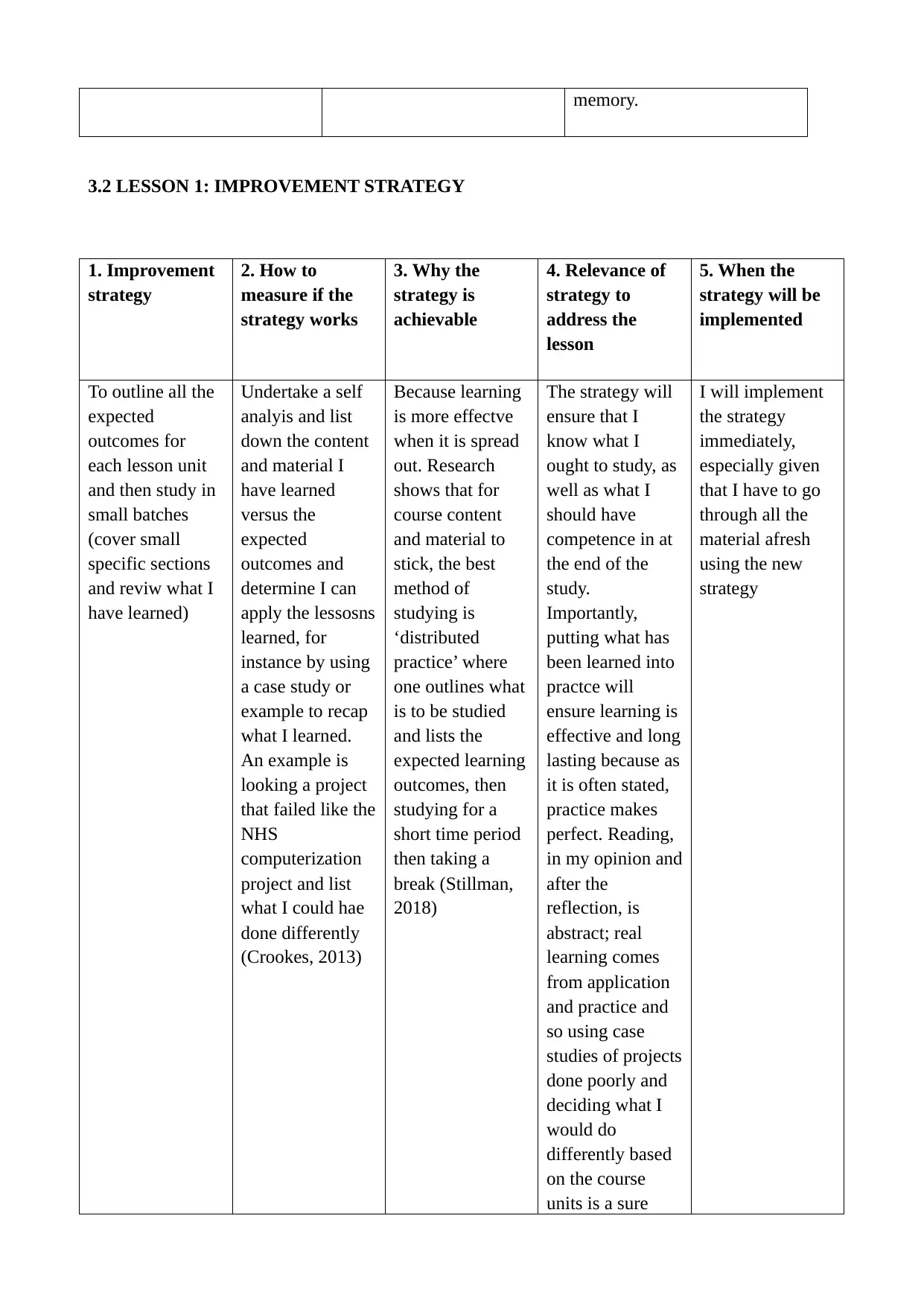
memory.
3.2 LESSON 1: IMPROVEMENT STRATEGY
1. Improvement
strategy
2. How to
measure if the
strategy works
3. Why the
strategy is
achievable
4. Relevance of
strategy to
address the
lesson
5. When the
strategy will be
implemented
To outline all the
expected
outcomes for
each lesson unit
and then study in
small batches
(cover small
specific sections
and reviw what I
have learned)
Undertake a self
analyis and list
down the content
and material I
have learned
versus the
expected
outcomes and
determine I can
apply the lessosns
learned, for
instance by using
a case study or
example to recap
what I learned.
An example is
looking a project
that failed like the
NHS
computerization
project and list
what I could hae
done differently
(Crookes, 2013)
Because learning
is more effectve
when it is spread
out. Research
shows that for
course content
and material to
stick, the best
method of
studying is
‘distributed
practice’ where
one outlines what
is to be studied
and lists the
expected learning
outcomes, then
studying for a
short time period
then taking a
break (Stillman,
2018)
The strategy will
ensure that I
know what I
ought to study, as
well as what I
should have
competence in at
the end of the
study.
Importantly,
putting what has
been learned into
practce will
ensure learning is
effective and long
lasting because as
it is often stated,
practice makes
perfect. Reading,
in my opinion and
after the
reflection, is
abstract; real
learning comes
from application
and practice and
so using case
studies of projects
done poorly and
deciding what I
would do
differently based
on the course
units is a sure
I will implement
the strategy
immediately,
especially given
that I have to go
through all the
material afresh
using the new
strategy
3.2 LESSON 1: IMPROVEMENT STRATEGY
1. Improvement
strategy
2. How to
measure if the
strategy works
3. Why the
strategy is
achievable
4. Relevance of
strategy to
address the
lesson
5. When the
strategy will be
implemented
To outline all the
expected
outcomes for
each lesson unit
and then study in
small batches
(cover small
specific sections
and reviw what I
have learned)
Undertake a self
analyis and list
down the content
and material I
have learned
versus the
expected
outcomes and
determine I can
apply the lessosns
learned, for
instance by using
a case study or
example to recap
what I learned.
An example is
looking a project
that failed like the
NHS
computerization
project and list
what I could hae
done differently
(Crookes, 2013)
Because learning
is more effectve
when it is spread
out. Research
shows that for
course content
and material to
stick, the best
method of
studying is
‘distributed
practice’ where
one outlines what
is to be studied
and lists the
expected learning
outcomes, then
studying for a
short time period
then taking a
break (Stillman,
2018)
The strategy will
ensure that I
know what I
ought to study, as
well as what I
should have
competence in at
the end of the
study.
Importantly,
putting what has
been learned into
practce will
ensure learning is
effective and long
lasting because as
it is often stated,
practice makes
perfect. Reading,
in my opinion and
after the
reflection, is
abstract; real
learning comes
from application
and practice and
so using case
studies of projects
done poorly and
deciding what I
would do
differently based
on the course
units is a sure
I will implement
the strategy
immediately,
especially given
that I have to go
through all the
material afresh
using the new
strategy
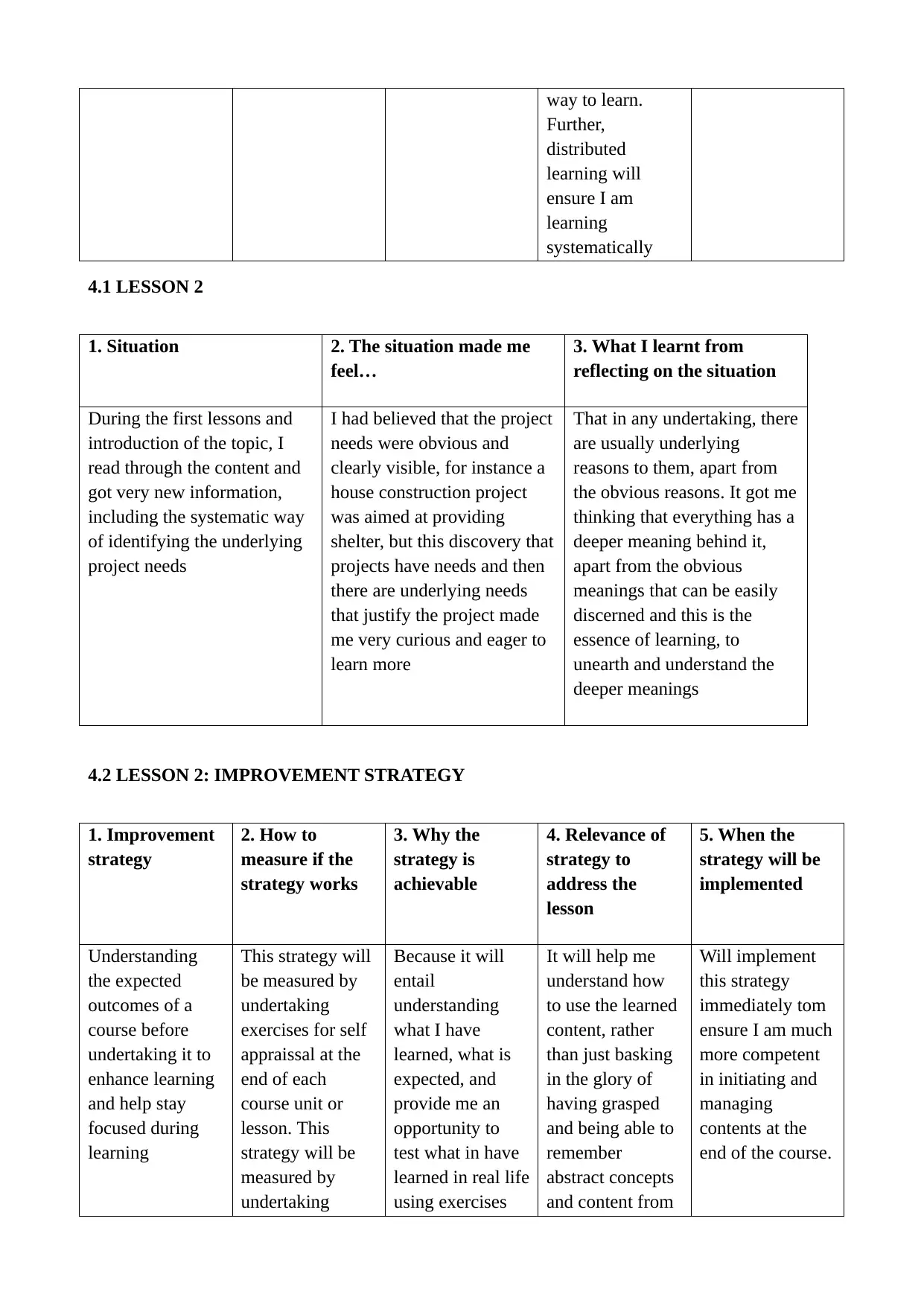
way to learn.
Further,
distributed
learning will
ensure I am
learning
systematically
4.1 LESSON 2
1. Situation 2. The situation made me
feel…
3. What I learnt from
reflecting on the situation
During the first lessons and
introduction of the topic, I
read through the content and
got very new information,
including the systematic way
of identifying the underlying
project needs
I had believed that the project
needs were obvious and
clearly visible, for instance a
house construction project
was aimed at providing
shelter, but this discovery that
projects have needs and then
there are underlying needs
that justify the project made
me very curious and eager to
learn more
That in any undertaking, there
are usually underlying
reasons to them, apart from
the obvious reasons. It got me
thinking that everything has a
deeper meaning behind it,
apart from the obvious
meanings that can be easily
discerned and this is the
essence of learning, to
unearth and understand the
deeper meanings
4.2 LESSON 2: IMPROVEMENT STRATEGY
1. Improvement
strategy
2. How to
measure if the
strategy works
3. Why the
strategy is
achievable
4. Relevance of
strategy to
address the
lesson
5. When the
strategy will be
implemented
Understanding
the expected
outcomes of a
course before
undertaking it to
enhance learning
and help stay
focused during
learning
This strategy will
be measured by
undertaking
exercises for self
appraissal at the
end of each
course unit or
lesson. This
strategy will be
measured by
undertaking
Because it will
entail
understanding
what I have
learned, what is
expected, and
provide me an
opportunity to
test what in have
learned in real life
using exercises
It will help me
understand how
to use the learned
content, rather
than just basking
in the glory of
having grasped
and being able to
remember
abstract concepts
and content from
Will implement
this strategy
immediately tom
ensure I am much
more competent
in initiating and
managing
contents at the
end of the course.
Further,
distributed
learning will
ensure I am
learning
systematically
4.1 LESSON 2
1. Situation 2. The situation made me
feel…
3. What I learnt from
reflecting on the situation
During the first lessons and
introduction of the topic, I
read through the content and
got very new information,
including the systematic way
of identifying the underlying
project needs
I had believed that the project
needs were obvious and
clearly visible, for instance a
house construction project
was aimed at providing
shelter, but this discovery that
projects have needs and then
there are underlying needs
that justify the project made
me very curious and eager to
learn more
That in any undertaking, there
are usually underlying
reasons to them, apart from
the obvious reasons. It got me
thinking that everything has a
deeper meaning behind it,
apart from the obvious
meanings that can be easily
discerned and this is the
essence of learning, to
unearth and understand the
deeper meanings
4.2 LESSON 2: IMPROVEMENT STRATEGY
1. Improvement
strategy
2. How to
measure if the
strategy works
3. Why the
strategy is
achievable
4. Relevance of
strategy to
address the
lesson
5. When the
strategy will be
implemented
Understanding
the expected
outcomes of a
course before
undertaking it to
enhance learning
and help stay
focused during
learning
This strategy will
be measured by
undertaking
exercises for self
appraissal at the
end of each
course unit or
lesson. This
strategy will be
measured by
undertaking
Because it will
entail
understanding
what I have
learned, what is
expected, and
provide me an
opportunity to
test what in have
learned in real life
using exercises
It will help me
understand how
to use the learned
content, rather
than just basking
in the glory of
having grasped
and being able to
remember
abstract concepts
and content from
Will implement
this strategy
immediately tom
ensure I am much
more competent
in initiating and
managing
contents at the
end of the course.
⊘ This is a preview!⊘
Do you want full access?
Subscribe today to unlock all pages.

Trusted by 1+ million students worldwide
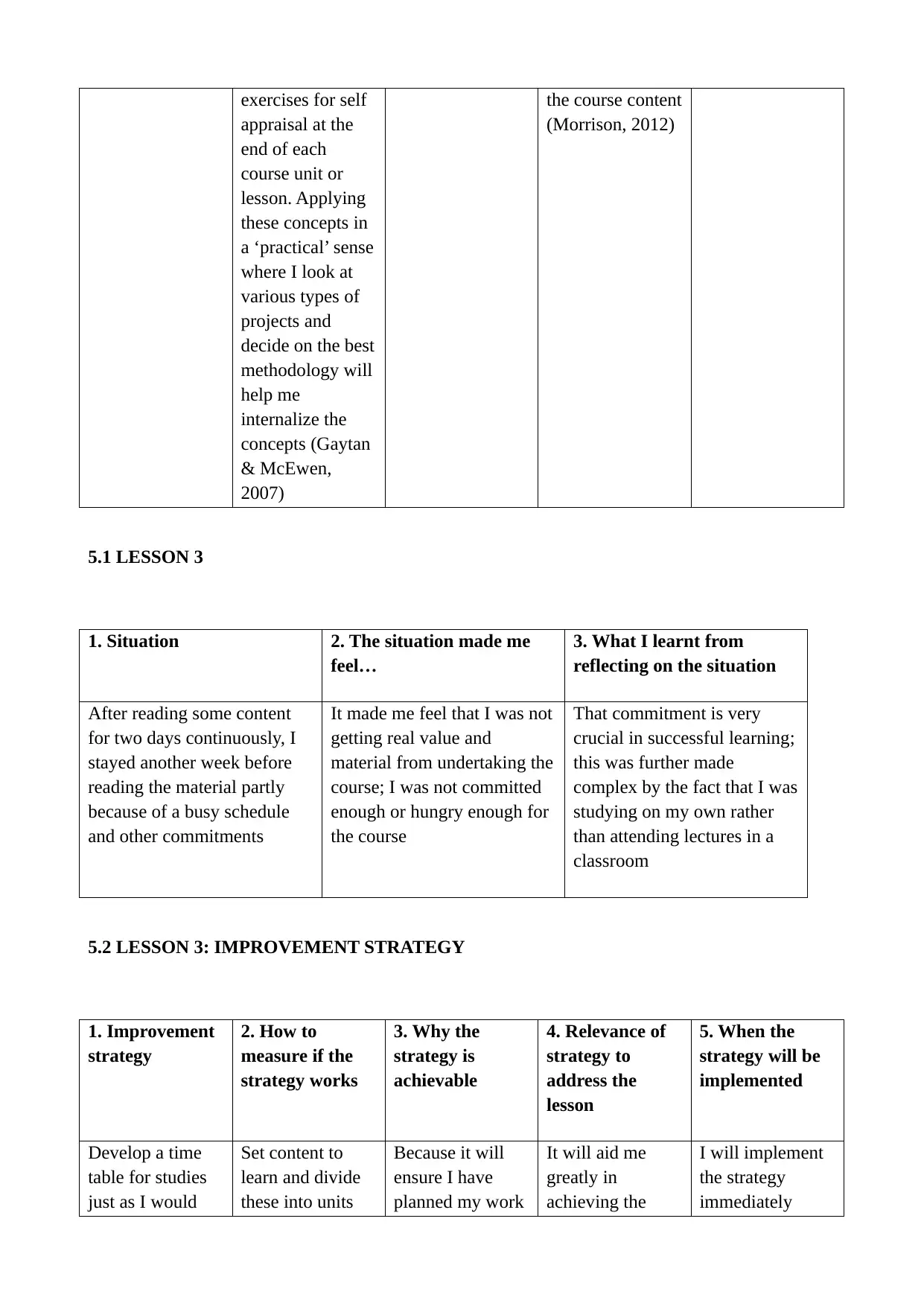
exercises for self
appraisal at the
end of each
course unit or
lesson. Applying
these concepts in
a ‘practical’ sense
where I look at
various types of
projects and
decide on the best
methodology will
help me
internalize the
concepts (Gaytan
& McEwen,
2007)
the course content
(Morrison, 2012)
5.1 LESSON 3
1. Situation 2. The situation made me
feel…
3. What I learnt from
reflecting on the situation
After reading some content
for two days continuously, I
stayed another week before
reading the material partly
because of a busy schedule
and other commitments
It made me feel that I was not
getting real value and
material from undertaking the
course; I was not committed
enough or hungry enough for
the course
That commitment is very
crucial in successful learning;
this was further made
complex by the fact that I was
studying on my own rather
than attending lectures in a
classroom
5.2 LESSON 3: IMPROVEMENT STRATEGY
1. Improvement
strategy
2. How to
measure if the
strategy works
3. Why the
strategy is
achievable
4. Relevance of
strategy to
address the
lesson
5. When the
strategy will be
implemented
Develop a time
table for studies
just as I would
Set content to
learn and divide
these into units
Because it will
ensure I have
planned my work
It will aid me
greatly in
achieving the
I will implement
the strategy
immediately
appraisal at the
end of each
course unit or
lesson. Applying
these concepts in
a ‘practical’ sense
where I look at
various types of
projects and
decide on the best
methodology will
help me
internalize the
concepts (Gaytan
& McEwen,
2007)
the course content
(Morrison, 2012)
5.1 LESSON 3
1. Situation 2. The situation made me
feel…
3. What I learnt from
reflecting on the situation
After reading some content
for two days continuously, I
stayed another week before
reading the material partly
because of a busy schedule
and other commitments
It made me feel that I was not
getting real value and
material from undertaking the
course; I was not committed
enough or hungry enough for
the course
That commitment is very
crucial in successful learning;
this was further made
complex by the fact that I was
studying on my own rather
than attending lectures in a
classroom
5.2 LESSON 3: IMPROVEMENT STRATEGY
1. Improvement
strategy
2. How to
measure if the
strategy works
3. Why the
strategy is
achievable
4. Relevance of
strategy to
address the
lesson
5. When the
strategy will be
implemented
Develop a time
table for studies
just as I would
Set content to
learn and divide
these into units
Because it will
ensure I have
planned my work
It will aid me
greatly in
achieving the
I will implement
the strategy
immediately
Paraphrase This Document
Need a fresh take? Get an instant paraphrase of this document with our AI Paraphraser
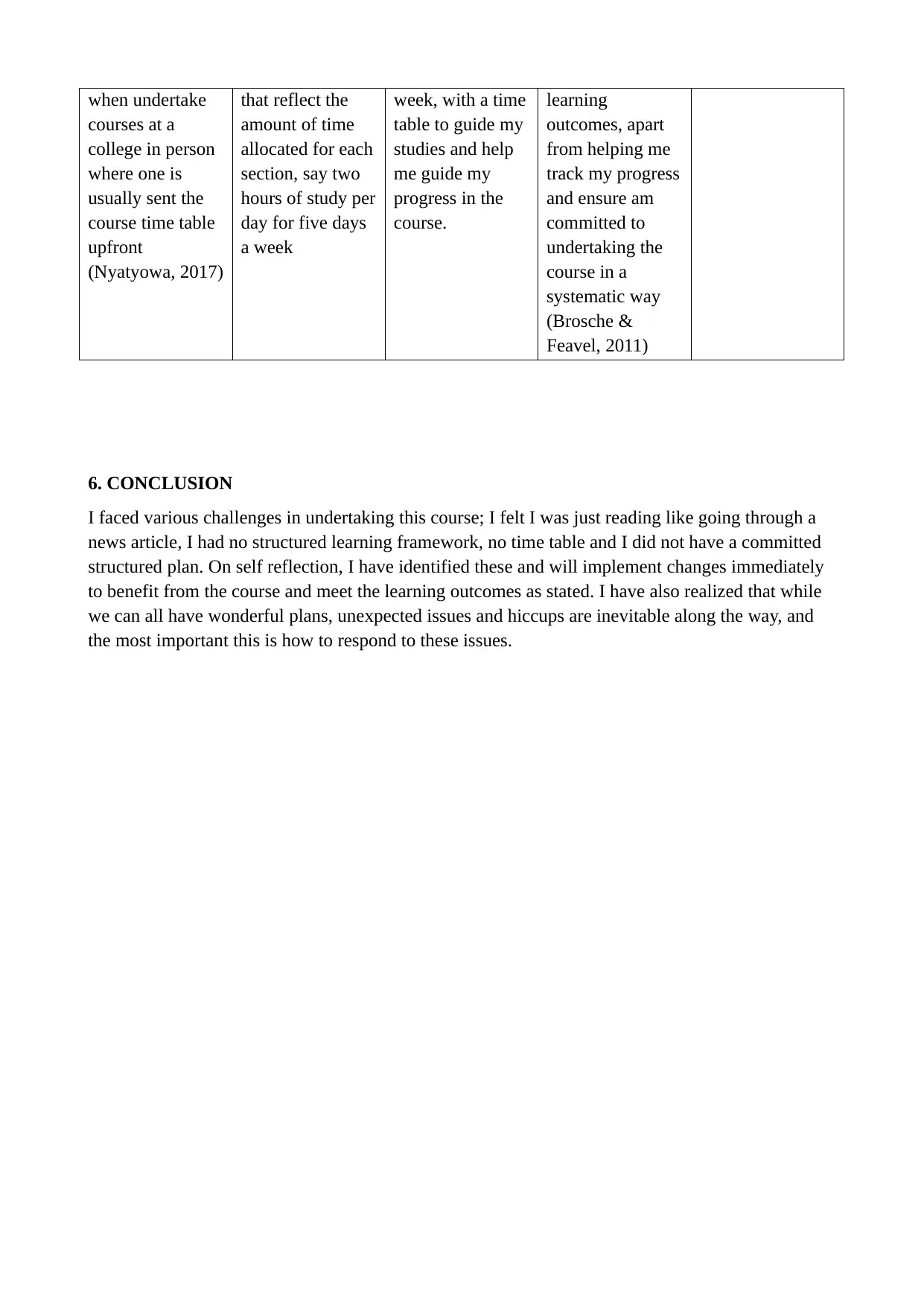
when undertake
courses at a
college in person
where one is
usually sent the
course time table
upfront
(Nyatyowa, 2017)
that reflect the
amount of time
allocated for each
section, say two
hours of study per
day for five days
a week
week, with a time
table to guide my
studies and help
me guide my
progress in the
course.
learning
outcomes, apart
from helping me
track my progress
and ensure am
committed to
undertaking the
course in a
systematic way
(Brosche &
Feavel, 2011)
6. CONCLUSION
I faced various challenges in undertaking this course; I felt I was just reading like going through a
news article, I had no structured learning framework, no time table and I did not have a committed
structured plan. On self reflection, I have identified these and will implement changes immediately
to benefit from the course and meet the learning outcomes as stated. I have also realized that while
we can all have wonderful plans, unexpected issues and hiccups are inevitable along the way, and
the most important this is how to respond to these issues.
courses at a
college in person
where one is
usually sent the
course time table
upfront
(Nyatyowa, 2017)
that reflect the
amount of time
allocated for each
section, say two
hours of study per
day for five days
a week
week, with a time
table to guide my
studies and help
me guide my
progress in the
course.
learning
outcomes, apart
from helping me
track my progress
and ensure am
committed to
undertaking the
course in a
systematic way
(Brosche &
Feavel, 2011)
6. CONCLUSION
I faced various challenges in undertaking this course; I felt I was just reading like going through a
news article, I had no structured learning framework, no time table and I did not have a committed
structured plan. On self reflection, I have identified these and will implement changes immediately
to benefit from the course and meet the learning outcomes as stated. I have also realized that while
we can all have wonderful plans, unexpected issues and hiccups are inevitable along the way, and
the most important this is how to respond to these issues.
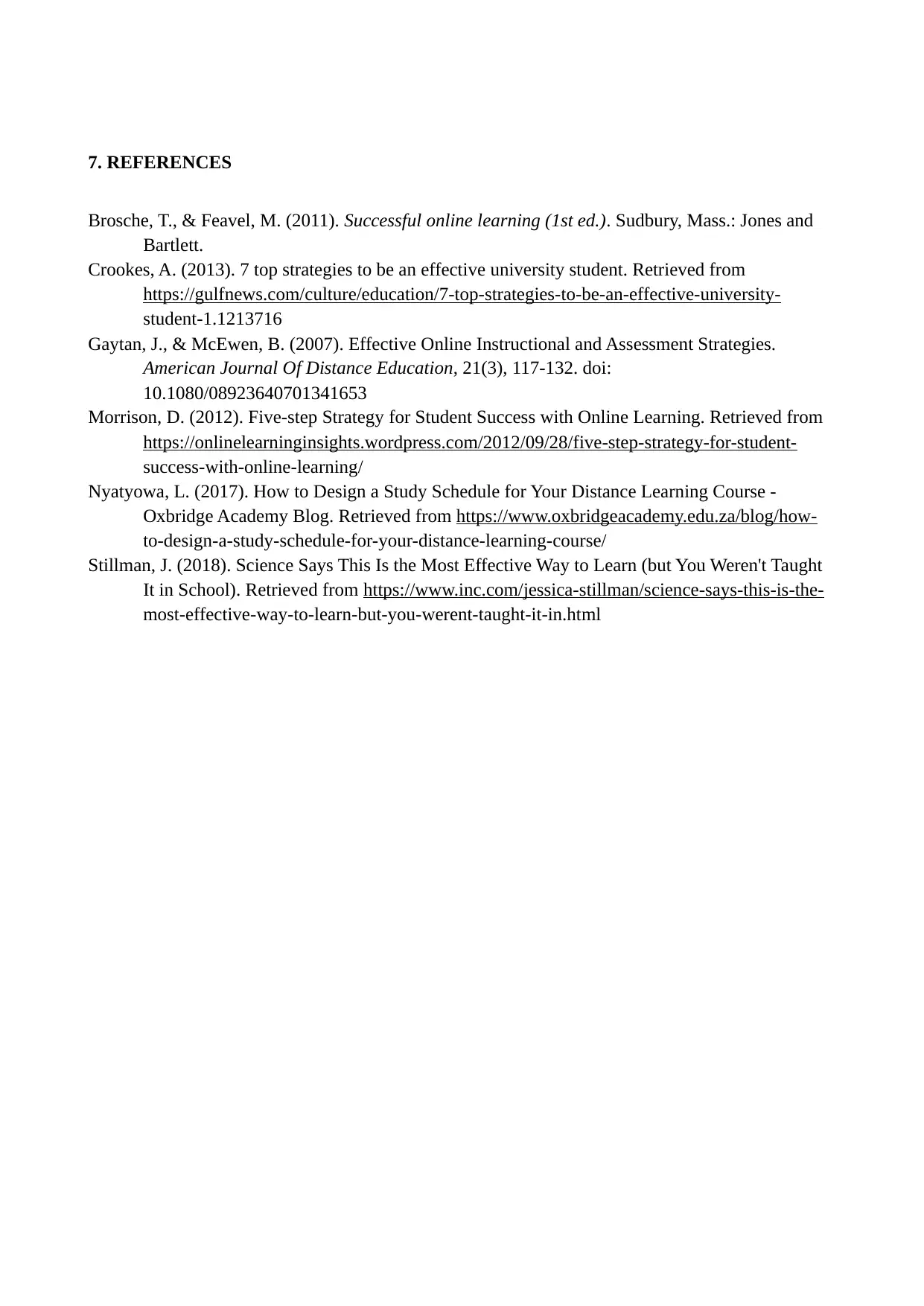
7. REFERENCES
Brosche, T., & Feavel, M. (2011). Successful online learning (1st ed.). Sudbury, Mass.: Jones and
Bartlett.
Crookes, A. (2013). 7 top strategies to be an effective university student. Retrieved from
https://gulfnews.com/culture/education/7-top-strategies-to-be-an-effective-university-
student-1.1213716
Gaytan, J., & McEwen, B. (2007). Effective Online Instructional and Assessment Strategies.
American Journal Of Distance Education, 21(3), 117-132. doi:
10.1080/08923640701341653
Morrison, D. (2012). Five-step Strategy for Student Success with Online Learning. Retrieved from
https://onlinelearninginsights.wordpress.com/2012/09/28/five-step-strategy-for-student-
success-with-online-learning/
Nyatyowa, L. (2017). How to Design a Study Schedule for Your Distance Learning Course -
Oxbridge Academy Blog. Retrieved from https://www.oxbridgeacademy.edu.za/blog/how-
to-design-a-study-schedule-for-your-distance-learning-course/
Stillman, J. (2018). Science Says This Is the Most Effective Way to Learn (but You Weren't Taught
It in School). Retrieved from https://www.inc.com/jessica-stillman/science-says-this-is-the-
most-effective-way-to-learn-but-you-werent-taught-it-in.html
Brosche, T., & Feavel, M. (2011). Successful online learning (1st ed.). Sudbury, Mass.: Jones and
Bartlett.
Crookes, A. (2013). 7 top strategies to be an effective university student. Retrieved from
https://gulfnews.com/culture/education/7-top-strategies-to-be-an-effective-university-
student-1.1213716
Gaytan, J., & McEwen, B. (2007). Effective Online Instructional and Assessment Strategies.
American Journal Of Distance Education, 21(3), 117-132. doi:
10.1080/08923640701341653
Morrison, D. (2012). Five-step Strategy for Student Success with Online Learning. Retrieved from
https://onlinelearninginsights.wordpress.com/2012/09/28/five-step-strategy-for-student-
success-with-online-learning/
Nyatyowa, L. (2017). How to Design a Study Schedule for Your Distance Learning Course -
Oxbridge Academy Blog. Retrieved from https://www.oxbridgeacademy.edu.za/blog/how-
to-design-a-study-schedule-for-your-distance-learning-course/
Stillman, J. (2018). Science Says This Is the Most Effective Way to Learn (but You Weren't Taught
It in School). Retrieved from https://www.inc.com/jessica-stillman/science-says-this-is-the-
most-effective-way-to-learn-but-you-werent-taught-it-in.html
⊘ This is a preview!⊘
Do you want full access?
Subscribe today to unlock all pages.

Trusted by 1+ million students worldwide
1 out of 9
Related Documents
Your All-in-One AI-Powered Toolkit for Academic Success.
+13062052269
info@desklib.com
Available 24*7 on WhatsApp / Email
![[object Object]](/_next/static/media/star-bottom.7253800d.svg)
Unlock your academic potential
Copyright © 2020–2026 A2Z Services. All Rights Reserved. Developed and managed by ZUCOL.



